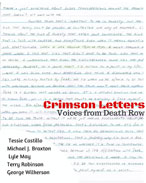
 |
Crimson Letters: Voices from Death Row
by Tessie Castillo, Michael J. Braxton, Lyle May, Terry Robinson, George Wilkerson
Black Rose Writing
In 2014, freelance writer Castillo was allowed to organize a journaling class within the walls of North Carolina's Death Row. This unusual privilege became the focal point for this emotive collection. She began a several-year correspondence with inmates Braxton, May, Robinson, and Wilkerson, whose recollections here open the door to a dark place that most people will never see. The men's writings provide memories of childhoods filled with drugs, weapons, violence, and fractured families where crime was an unavoidable norm and staying tough was a desperate necessity. The men lay bare their tender feelings for family and each other. Some express the introspection that makes true religious conversion a reality. One of the book's toughest segments recalls the hours before executions, with men hugging their doomed fellow inmate, declaring in one case, "You're good people to me." The prisoners write realistically, even poetically, recalling experiences most outsiders can scarcely imagine and which are rarely shown to the public.
In gathering and honing these carefully chosen letters, Castillo created rooted friendships and performed a service to their writers that they could never have conjured in their isolated existence amidst their brutal treatment. For example, through her involvement, one inmate has attained a college degree, and some programs for inmates have been funded. She candidly admits that she initially had the common preconception that Death Row housed only the worst criminals, yet two men in her grouping had not murdered anyone. Her research remarkably revealed that the imposition of the death sentence "resembles a lottery." Though some will read Castillo's collection with hope for reform, her experience indicates that realism is the better path since we are all flawed: "better than our worst crimes, but less than our highest ideals." Her book merits the attention of those interested in criminal justice and all thoughtful, compassionate readers.
A 2021 Eric Hoffer Book Award Category Finalist
RECOMMENDED by the US Review